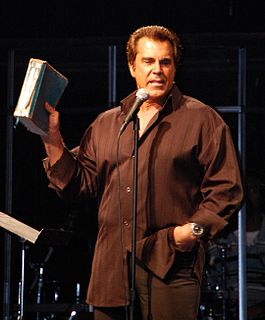A Quote by Carman
God's righteousness and His unchangeable law make Christianity a stumbling block for many. Organizations and individuals carry a political and moral agenda that aims to remove all obstacles to their sin. Their goal is to 'break God's bands asunder and cast away His cords.' They counsel together to rid themselves of the law of God; anyone who preaches the gospel or stands for righteousness stands in the way of their agenda.
Related Quotes
Only when we see that the way of God's law is absolutely inflexible will we see that God's grace is absolutely indispensable. A high view of the law reminds us that God accepts us on the basis of Christ's perfection, not our progress. Grace, properly understood, is the movement of a holy God toward an unholy people. He doesn't cheapen the law or ease its requirements. He fulfills them in his Son, who then gives his righteousness to us. That's the gospel. Pure and simple.
I think, that a man never passes the verge of moral humility, till self-righteousness be dethroned, till the high and towering imaginations of the man's own righteousness by the law be levelled by the mighty weapons of the gospel, and he brought to submit to the righteousness of God for justification, which is, in the gospel revealed 'from faith to faith.'
Trust wholly in Christ; rely altogether on His sufferings; beware of seeking to be justified in any other way than by His righteousness. Faith in our Lord Jesus Christ is sufficient for salvation. There must be atonement made for sin according to the righteousness of God. The person to make this atonement must be God and man.
How so? Briefly, apart from the gospel and outside of Christ, the law is my enemy and condemns me. Why? Because God is my enemy and condemns me. But with the gospel and in Christ, united to him by faith, the law is no longer my enemy but my friend. Why? Because now God is no longer my enemy but my friend, and the law, his will—the law in its moral core, as reflective of his character and of concerns eternally inherent in his own person and so of what pleases him—is now my friendly guide for life in fellowship with God.
The fatuous idea that a person can be holy by himself denies God the pleasure of saving sinners. God must therefore first take the sledge-hammer of the Law in His fists and smash the beast of self-righteousness and its brood of self-confidence, self wisdom, and self-help. When the conscience has been thoroughly frightened by the Law it welcomes the Gospel of grace with its message of a Savior Who came-not to break the bruised reed nor to quench the smoking flax-but to preach glad tidings to the poor, to heal the broken-hearted, and to grant forgiveness of sins to all the captives.
Blessed are they that hunger and thirst after righteousness: for they shall be filled. Not only do the followers of Jesus renounce their rights, they renounce their own righteousness too. They get no praise for their achievements or sacrifices. They cannot have righteous– ness except by hungering and thirsting for it (this applies equally to their own righteousness and to the righteousness of God on earth ), always they look forward to the future righteousness of God, but they cannot establish it for themselves. Those who follow Jesus grow hungry and thirsty on the way.
Yet, after all, faith is not our righteousness. It is accounted to us in order to righteousness (Rom 4:5, GREEK), but not as righteousness; for in that case it would be a work like any other doing of man, and as such would be incompatible with the righteousness of the Son of God; the righteousness which is by faith. Faith connects us with the righteousness, and is therefore totally distinct from it. To confound the one with the other is to subvert the whole gospel of the grace of God. Our act of faith must ever be a separate thing from that which we believe.
We make a big mistake when we conclude that the law is the answer to bad behavior. In fact, the law alone stirs up more of such behavior. People get worse, not better, when you lay down the law. To be sure, the Spirit does use both God's law and God's gospel in our sanctification. But the law and the gospel do very different things.
The honor that we pay to the Son of God, as well as that which we render to God the Father, consists of an upright course of life. This is plainly taught us by the passage, "You that boast of the Law, through breaking the Law dishonor God."...For if he who transgresses the law dishonors God by his transgression,...it is evident that he who keeps the law honors God. So the worshipper of God is he whose life is regulated by the principles and teachings of the Divine Word



































